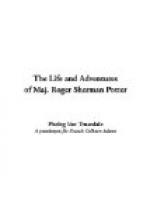And Fame, I thought, continued discoursing to me in this manner until I reached the cabin of my father, when she bid me good night and departed. I entered the cabin and found my father, who was bent with age, sitting by the great fire-place, mending his nets. My mother was at her wheel, spinning flax. She was a tidy little body, of the old school. Her notions of the world in general were somewhat narrow and antiquated; while the steeple-crown cap she wore on her head so jauntily, and her apron of snow-white muslin, that hung so neatly over a black silk dress, and was secured about the neck with a small, crimped collar, gave her an air of cheerfulness the sweet-ness of her oval face did much to enhance. My father, whose face and hands were browned with the suns of some sixty summers, had a touch of the patriarch about him. He often declared the world outside of Cape Cod so wicked as not to be worth living in. He was short of figure, had flowing white hair, a deeply-wrinkled brow, and corrugated lips, and blue eyes, over-arched with long, brown eyelashes. My mother ran to me, and my father grasped me firmly by the hand, for he was not a little concerned about my stay on the beach. Indeed, I may as well confess, that he regarded me as a wayward youth, over whom it was just as well to exercise a guardian hand. In his younger days he had been what was called extremely good looking, a quality he frequently told me I had inherited, and from which he feared I might suffer grievous harm, unless I exercised great caution when divers damsels he had a jealous eye upon approached me. My mother was less jealous of my exploits among the sex, which she rather encouraged.
Another cause of anxiety with my father was the fact that I had written a “Life and Times” of Captain Seth Brewster; which work, though the hero was a fisherman, reached a sale of forty thousand copies, put money in my pocket, and made me the pet of all the petticoats round about. It was not unnatural, then, that my father, with his peculiar turn of mind, should set me down as being partially insane. I had also manufactured several very highly-colored verses in praise of Cape Cod; and these my publisher, who was by no means a tricky man, said had made a great stir in the literary world. And his assertion I found confirmed by the critics, who, with one accord, and without being paid, declared these verses proof that the author possessed “a rare inventive genius.” The meaning of this was all Hebrew to me. My mother suggested that it might be a figure of speech copied from Chaldean mythology.
Another cause of alarm for my morals, in the eyes of my father, was the fact of my having made two political speeches. And these, according to divers New York politicians, had secured Cape Cod to General Pierce. And, as a reward for this great service, and to the end of illustrating in some substantial manner (so it is written at this day) their appreciation of a politician so distinguished, I was waited upon




